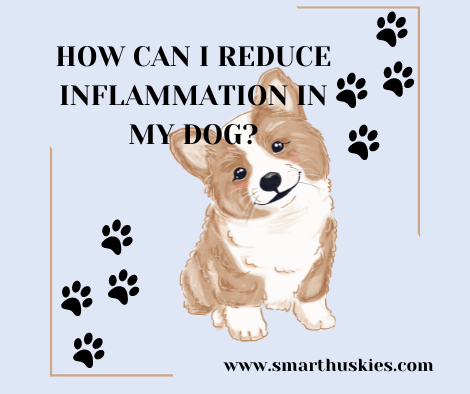The inflammation response is a natural process that helps the body heal and protects itself from infection and injury. However, chronic inflammation can lead to a variety of health problems, including joint pain, heart disease, and cancer. Also, inflammation can cause discomfort and distress for your dog. Did you know that there are many ways to help reduce inflammation in your dog?
Table of Contents
That said, here are 10 tips to help reduce inflammation in your dog:
1. Provide a healthy diet
Give your dog a nutritious diet that includes plenty of fresh, whole foods. Avoid processed foods and those that contain additives and fillers. Consider adding an anti-inflammatory supplement to your dog’s diet as well.
2. Get regular exercise
Make sure your dog gets plenty of exercises. Regular exercise helps to reduce inflammation and promote overall health.
3. Avoid environmental toxins
Limit your dog’s exposure to environmental toxins, such as pesticides, herbicides, and household cleaners. These can all contribute to inflammation.
4. Reduce stress
Try to reduce stress in your dog’s life. Stress can worsen inflammation and lead to other health problems.
5. CBD oil for dogs
CBD oil is a natural anti-inflammatory substance that can help to reduce inflammation in your dog. It can be given orally or applied topically. Also, it’s important to choose a high-quality CBD oil that is designed for dogs.
6. Acupuncture
Acupuncture is a traditional Chinese medicine technique that has been shown to be effective in reducing inflammation.
7. Chiropractic care
Chiropractic care can also help to reduce inflammation and promote overall health.
8. Hydrotherapy
Hydrotherapy, or water therapy, is another great option for reducing inflammation. This involves using water to massage the body and relieve pain and stiffness. Also, the buoyancy of the water helps to reduce stress on the joints.
9. Supplements
There are many different supplements that can help to reduce inflammation. Some of the most popular options include omega-3 fatty acids, turmeric, and green tea extract.
10. Keep your dog at a Healthy weight

Maintaining a healthy weight is important for reducing inflammation. Obesity can lead to a number of health problems, including joint pain, diabetes, and heart disease.
11. Heat therapy
Heat therapy can also help to reduce inflammation. This can be done using heat pads, warm compresses, or even hot water bottles. Soak a towel in warm water and apply it to the affected area for 20 minutes at a time.
12. Cold therapy
Cold therapy can also be effective in reducing inflammation. This can be done using cold compresses, ice packs, or even frozen peas. Apply the cold compress to the affected area for 20 minutes at a time.
13. Medications
There are a variety of anti-inflammatory medications that can help to reduce inflammation. These include NSAIDs (non-steroidal anti-inflammatory drugs), corticosteroids, and biologics. However, it’s important to talk to your vet before giving your dog any medication, as some can have serious side effects.
14. Surgery
In some cases, surgery may be necessary to reduce inflammation. This is typically only done as a last resort when other methods have failed.
15. Alternative therapies
There are many different alternative therapies that can help to reduce inflammation. These include acupuncture, chiropractic care, massage, and hydrotherapy. Talk to your vet about which option may be best for your dog.
Things you should never do when massaging your dog:
– Don’t massage an area that is injured or sore. This can worsen the injury and increase inflammation.
– Don’t massage an area that is infected. This can spread the infection and make it worse.
– Don’t massage an area that is swollen. This can increase swelling and discomfort.
We hope this article has been helpful in teaching you how to reduce inflammation in your dog. If you have any questions or concerns, please speak with your veterinarian. They will be able to provide you with the best guidance for your individual pet.







